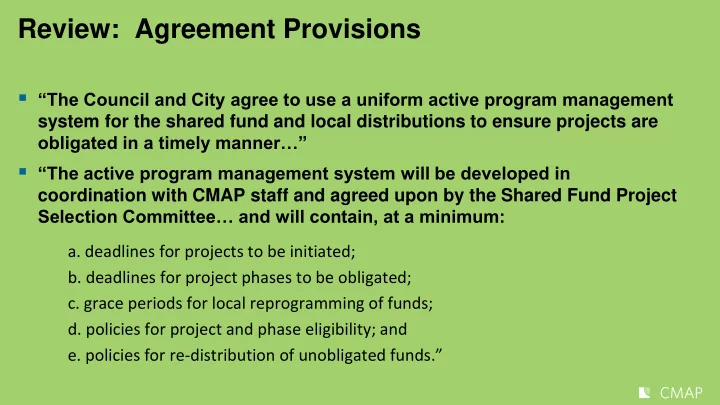

Review: Agreement Provisions “The Council and City agree to use a uniform active program management system for the shared fund and local distributions to ensure projects are obligated in a timely manner…” “The active program management system will be developed in coordination with CMAP staff and agreed upon by the Shared Fund Project Selection Committee… and will contain, at a minimum: a. deadlines for projects to be initiated; b. deadlines for project phases to be obligated; c. grace periods for local reprogramming of funds; d. policies for project and phase eligibility; and e. policies for re- distribution of unobligated funds.”
Review: Issues & Options ISSUES OPTIONS Projects don’t start on time Realistic programming Lagging projects or phases Project sunsets Agreement delays Frequent status updates Funds are “reserved” for projects Active reprogramming that are delayed Regular and uniform calls for projects ROW delays can be significant and are not Standardized implementation procedures controlled by sponsor Changing local priorities/politics Lack of awareness of project status by decision/policy makers Early phases using local funds make construction “come out of nowhere” Balance keeping funding local vs. replenishing the shared fund
Proposal: Program Development Calls for Projects Uniform schedule, every 2 years – Consistency – Transparency – Ability to “plan ahead” Calls open in January and close in March 2 - 3 months for staff review and ranking 2 – 3 months for committee debate & public comment Final programs submitted as TIP amendment for MPO approval in October
Proposal: Active Programs Fiscally constrained, five-year program – Year 1 = “Current Year” – Years 2 – 5 = “Out Years” Included in TIP Current Year – Subject to Obligation Deadlines Out Years – No Deadlines Out Years - Projects expire only due to inactivity, as long as sponsor commitment continues via: – Project(s) included in an adopted Capital Improvements Program (CIP) – Resolution of Village Board/City Council – Letter from highest official (mayor/manager/commissioner)
Proposal: Project Management Training Designated Project Managers Status Updates
Proposal: Project Management Training Suggested by stakeholders CMAP in partnership with FHWA, IDOT, and Councils Requirements at discretion of each Council, CDOT, and STP PSC
Proposal: Project Management Designated Project Managers Technical Project Manager Financial Project Manager Consultant Project Manager (if applicable)
Proposal: Project Management Status Updates Milestone based (estimated/actual dates) Central, online reporting – Convenient – Accessible to implementation stakeholders – Identify regional patterns to address or adjust expectations Quarterly, at a minimum
Proposal: Program Management Obligation Deadlines Project phases in the current FFY must obligate funds (start the phase) by 9/30 Milestones to meet in order to reach obligation – agreements and pre-final plans Use status updates to identify delay risk in early spring Sponsor chooses a course of action, based on risk – Request an extension – Move from active to contingency program – Proceed at their own risk
Proposal: Obligation Deadlines Extensions Phase 1 or Phase 2 Engineering or Right of Way: 3 months (to Dec 31) Construction: 6 months (to the date associated with the April state letting) Must request by TBD date in April Selecting body staff decides, based on ability to meet extended deadline If request denied, can appeal or select other options If approved, programmed funds will be carried over (subject to limits) If not obligated by deadline: – Project moved to contingency program – Programmed funds are withdrawn from balance
Proposal: Program Management Active Reprogramming Can occur at any time, with publication of revised active and contingency programs Can occur as part of a call for projects Current year funds can be actively reprogrammed for: – Cost changes for programmed or already obligated phases – Accelerating phases programmed in out years of the active program that are ready to obligate – Accelerating phases included in the contingency program that are ready to obligate Out year reprogramming subject only to maintaining fiscal constraint
Proposal: Program Management Carryover Limitations & Redistribution of Unobligated Funding No more than the annual allotment can be carried over at the end of each FFY Carryover can be from: Carryover cannot be from: – Obligation Remainders – Unprogrammed funds – Funds programmed for a – Projects that proceeded at project(s) granted an extension their own risk Unobligated funds not carried over will be redistributed to the shared fund for immediate use
Assistance for Disadvantaged Communities Proposal: Use of TDCs (Toll Credits) for local match Municipal capacity measures determine eligibility (like LTA, CMAQ, TAP-L) – Median income – Tax base per capita – Total tax base – Population Cannot be used for ROW phase Must be requested on application and included in approved program – Credits result in obligation of additional federal funds that must be included in program At discretion of councils (local program) and STP PSC (shared fund) Requires changes to IDOT policies
Methodology Considerations Consider points for project readiness/current status as an incentive for making progress Consider Pavement Management System provisions Consider minimum scoring to receive funding
Active Program Management System development timeline Selection Committee discussion – Jan 2018: issues & options – Mar 2018: initial proposal – May 2018: revised proposal – Summer 2018: council and partner feedback – Sep 2018: Approval Discussion of shared fund methodology continues in April and June Programming cycle begins with call for shared fund projects in Jan 2019 and local program projects in Jan 2020
Recommend
More recommend